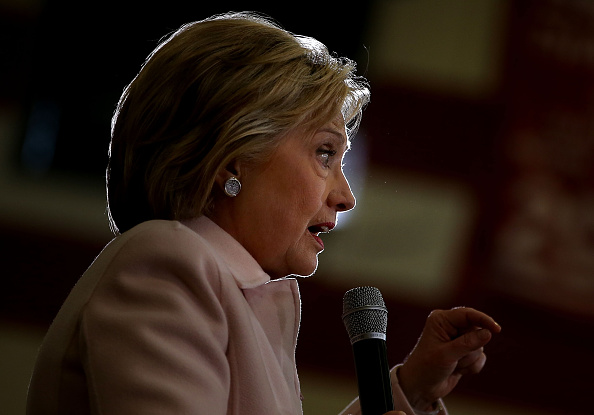
The announcement by the State Department, three days before the Iowa caucuses, that 22 of the messages from former Secretary of State Hillary Clinton’s private e-mail server contained Top Secret information has political watchers, and much of the country, wondering just how bad the scandal will get.
Ultimately, the answer depends on the slow, deliberate, and largely invisible investigation by the FBI and the Justice Department of the potential mishandling of classified information in the Democratic front-runner’s emails.
The good news for Clinton is that the bar for any legal damage from that investigation is high. The bad news is that the probe will likely drag on well past the State Department’s final release of her e-mails over the coming month, which means the political costs for Clinton could continue to rise.
The State Department announcement came hours before the release of 909 more Clinton e-mails. Since last summer, the department has been reviewing 55,000 pages of work e-mails her lawyers handed over to it in response to a Freedom of Information Act request.
The judge overseeing that FOIA litigation ordered the department to release all of the e-mails by the end of this month. But the process has dragged out as State and the six largest intelligence agencies, including the CIA, the NSA and others, figure out what material can be released to the public.
So far State and the intelligence community representatives reviewing the e-mails have found more than 1,500 that contain material originally declared classified by the State department. The classified material in those e-mails was redacted and they have been released.
Read More: Hillary Clinton’s Lawyer Readies for Email War
Dozens of other e-mails, according to a letter sent to Congress by the Inspector General of the Intelligence Community on Jan. 14, contain material originally classified by other agencies. Generally speaking, material classified by agencies like the CIA, which handles much of the country’s human intelligence, or the NSA, which generates signals intelligence, is considered more sensitive than those secrets produced by diplomats.
In its announcement Friday, State confirmed on that the 22 emails that contained Top Secret information were among those referred to in the IG’s letter to Congress. The department said that none of the emails, including those originally created by the spy agencies, had been marked classified at the time they were sent. It said none of the e-mails with Top Secret information in them would be released in any form.
The Clinton campaign has focused its criticism on the process of releasing the e-mails. On Friday, Clinton’s press secretary Brian Fallon told MSNBC that the process had been “hijacked” by the inspectors general at State and the intelligence community. He said that all the e-mails should be released and that Clinton was falling victim to rampant “over-classification.” Previously he accused the one of the inspectors general of colluding with Republicans on Capitol Hill.
Framing the debate around the process may help Clinton get through the final release of e-mails over the next month. The harder question is what will happen in the course of the FBI investigation.
The laws regarding the mishandling of classified information are generally aimed at preventing and punishing espionage. No one has suggested that Clinton or any of her aides or employees at the State Department intended to harm the interests of the United States in their handling of the classified material.
The laws also empower the FBI and prosecutors to seek punishment for gross negligence in the handling of secrets generated by spy agencies like the NSA. Proving that in a court, however, requires evidence that Clinton had a “guilty state of mind,” according to George W. Bush’s last Attorney General, Michael Mukasey, who wrote an op-ed in the Wall Street Journal suggesting she did.
Read More: The High Stakes of Hillary Clinton’s Email Scandal
The decision to test Clinton’s state of mind in the e-mail matter will not be made lightly by law enforcement officials. And that likely means it will not come quickly.
First the FBI would have to collect enough documentary evidence to convince themselves and prosecutors at Justice that Clinton might have knowingly and repeatedly mishandled the information. Then investigators would have to interview the diplomats who originally mishandled classified information by putting it on unsecure e-mail systems at State. Then they would interview Clinton aides who passed the information along to her on her private server. And finally they’d ask to interview Clinton.
Only then would a discussion begin within the Justice Department over whether to pursue any legal action against Clinton or anyone else involved in the matter. While investigators from the FBI and the National Security Division are actively collecting and analyzing documents, there is no sign that any interviews have been undertaken yet. Several individuals involved in the case, including one intelligence official, tell TIME they have not been interviewed.
In the meantime, the e-mails continue to dribble out. State has asked the judge in the FOIA case for another month to finish the job of releasing to the public those that don’t contain Top Secret information. If the judge ultimately grants State’s request, the new deadline for the release of e-mails would come the day before Super Tuesday, March 1.
More Must-Reads from TIME
- Cybersecurity Experts Are Sounding the Alarm on DOGE
- Meet the 2025 Women of the Year
- The Harsh Truth About Disability Inclusion
- Why Do More Young Adults Have Cancer?
- Colman Domingo Leads With Radical Love
- How to Get Better at Doing Things Alone
- Michelle Zauner Stares Down the Darkness
Contact us at letters@time.com